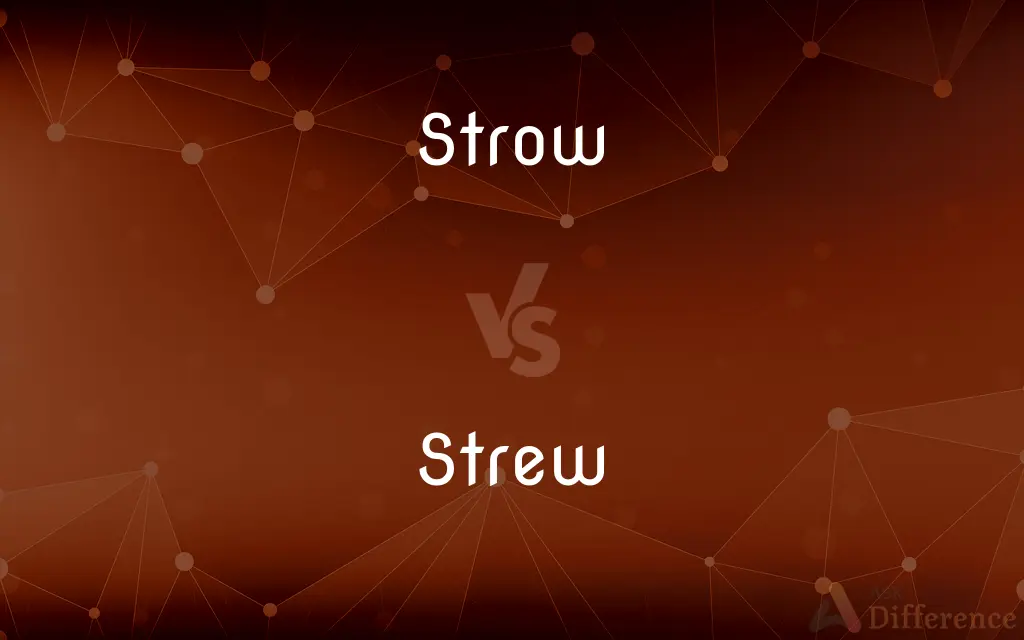Strow vs. Strew — What's the Difference?
Edited by Tayyaba Rehman — By Urooj Arif — Updated on May 4, 2024
"Strow" is often used as a past form of "strew," indicating the act of scattering or spreading things around, while "strew" is the present tense form used for the same action.

Difference Between Strow and Strew
Table of Contents
ADVERTISEMENT
Key Differences
"Strow" is typically used in some dialects and older forms of English as the past tense of "strew," implying a completed action of scattering. Whereas, "strew" is commonly used in modern standard English in its present tense form, referring to the act of scattering objects or substances loosely.
In some contexts, "strow" appears in poetic or archaic usage, enhancing a historical or stylistic flavor to the text. On the other hand, "strew" is used in everyday language, often in instructions or descriptions of actions involving distribution over an area.
"Strow" can sometimes be found in literature or historical texts, providing a sense of antiquity and traditional language use. Conversely, "strew" is frequently seen in contemporary writings, reflecting current usage and linguistic norms.
While "strow" might confuse modern readers or listeners due to its rarity, "strew" is straightforward and widely understood, making it a more practical choice in most communicative situations.
The usage of "strow" is more common in specific regional dialects or in the context of certain poetic forms, which preserves its usage despite being archaic. Whereas "strew" maintains a versatile role in both spoken and written English across various contexts and regions.
ADVERTISEMENT
Comparison Chart
Tense/Form
Mostly past tense
Present tense
Usage
Archaic, dialectical
Modern, standard English
Commonality
Rare, limited to specific contexts
Widely used, understood universally
Stylistic Flavor
Poetic, historical
Contemporary, straightforward
Context
Literary, historical texts
Everyday language, instructions
Compare with Definitions
Strow
To cover or distribute loosely over a surface.
Leaves were strowed across the lawn.
Strew
To scatter or spread things loosely over an area.
She strews birdseed in the backyard every morning.
Strow
Past tense of strew, used for scattering or spreading things around.
They strow flowers on the path.
Strew
Commonly used in instructions and descriptive texts.
Strew the confetti over the table.
Strow
Archaic form used in poetry or historical narratives.
The pages were strowed with rose petals.
Strew
Suitable for both spoken and written contemporary English.
They strew flowers along the aisle for the wedding.
Strow
Occasionally used in specific regional dialects.
He strowed the seeds in the field.
Strew
Present tense form indicating an ongoing or habitual action.
He strews his clothes around the room.
Strow
Rarely appears in modern usage except in specific literary contexts.
The ground was strowed with autumn’s decay.
Strew
Versatile in usage across various contexts.
The wind strews leaves across the sidewalk.
Strow
Obsolete form of strew
Strew
To spread here and there; scatter or distribute
Strewing flowers down the aisle.
Strow
Same as Strew.
Thick as autumnal leaves that strow the brooksIn Vallombrosa.
A manner turbid . . . and strown with blemished.
Strew
To distribute something over (an area or surface)
"Italy ... was strewn thick with the remains of Roman buildings" (Bernard Berenson).
Strew
To be or become dispersed over (a surface)
"Enemy is retiring ... His dead men and horses strew the roads" (Jeb Stuart).
Strew
To spread (something) over a wide area; disseminate.
Strew
To distribute objects or pieces of something over an area, especially in a random manner.
To strew sand over a floor
The files had been strewn all over the floor.
Strew
(archaic) To cover, or lie upon, by having been scattered.
Leaves strewed the ground.
Strew
To spread abroad; to disseminate.
Strew
To populate with at random points; to cause to appear randomly distributed throughout.
Strew
To scatter; to spread by scattering; to cast or to throw loosely apart; - used of solids, separated or separable into parts or particles; as, to strew seed in beds; to strew sand on or over a floor; to strew flowers over a grave.
And strewed his mangled limbs about the field.
On a principal table a desk was open and many papers [were] strewn about.
Strew
To cover more or less thickly by scattering something over or upon; to cover, or lie upon, by having been scattered; as, they strewed the ground with leaves; leaves strewed the ground.
The snow which does the top of Pindus strew.
Is thine alone the seed that strews the plain?
Strew
To spread abroad; to disseminate.
She may strew dangerous conjectures.
Strew
Spread by scattering (
Straw
Strew toys all over the carpet
Strew
Cover; be dispersed over;
Dead bodies strewed the ground
Common Curiosities
Are there any synonyms for "strew"?
Yes, synonyms include scatter, sprinkle, spread, and disperse.
What is the basic difference between "strow" and "strew"?
"Strow" is typically an archaic or dialectical past tense of "strew," which is used in the present tense to describe scattering loosely.
Is "strew" appropriate for formal writing?
Yes, "strew" is appropriate and commonly used in both formal and informal contexts.
How do you conjugate the verb "strew"?
Present: strew, Past: strewed, Past participle: strewed or strewn.
Can "strow" be used in modern English?
While it can be used, "strow" is rare and generally appears in poetic or historical contexts.
Why might someone choose to use "strow" in writing?
Using "strow" can add a historical or stylistic flavor to a piece, especially in literary or poetic contexts.
Is "strew" commonly understood across all English dialects?
Yes, "strew" is widely understood in various English-speaking regions.
What are some examples of how to use "strew" in a sentence?
"Carefully strew the petals over the bed," or "The table was strewed with papers."
What does it mean to strew something?
To strew means to scatter or spread items loosely over an area.
Are there any particular literary works where "strow" is used effectively?
Yes, in some older poetry and historical novels, "strow" is used to evoke a period atmosphere.
What is a common mistake people make with "strow" and "strew"?
Confusing "strow" as a present tense form; it is generally a past tense or poetic variant.
How can learning about "strow" help in understanding historical English?
It highlights how language evolves and helps in interpreting older texts accurately.
Is "strew" used in both written and spoken English?
Yes, "strew" is commonly used in both modalities across various contexts.
How does the use of "strow" affect the tone of a text?
It can give a text an archaic or quaint tone, suggesting an older time period or style.
Does "strow" have any specific regional uses?
It appears occasionally in Scottish and some other regional dialects.
Share Your Discovery

Previous Comparison
Foreman vs. Ganger
Next Comparison
Piano vs. KeyboardAuthor Spotlight
Written by
Urooj ArifUrooj is a skilled content writer at Ask Difference, known for her exceptional ability to simplify complex topics into engaging and informative content. With a passion for research and a flair for clear, concise writing, she consistently delivers articles that resonate with our diverse audience.
Edited by
Tayyaba RehmanTayyaba Rehman is a distinguished writer, currently serving as a primary contributor to askdifference.com. As a researcher in semantics and etymology, Tayyaba's passion for the complexity of languages and their distinctions has found a perfect home on the platform. Tayyaba delves into the intricacies of language, distinguishing between commonly confused words and phrases, thereby providing clarity for readers worldwide.
















































